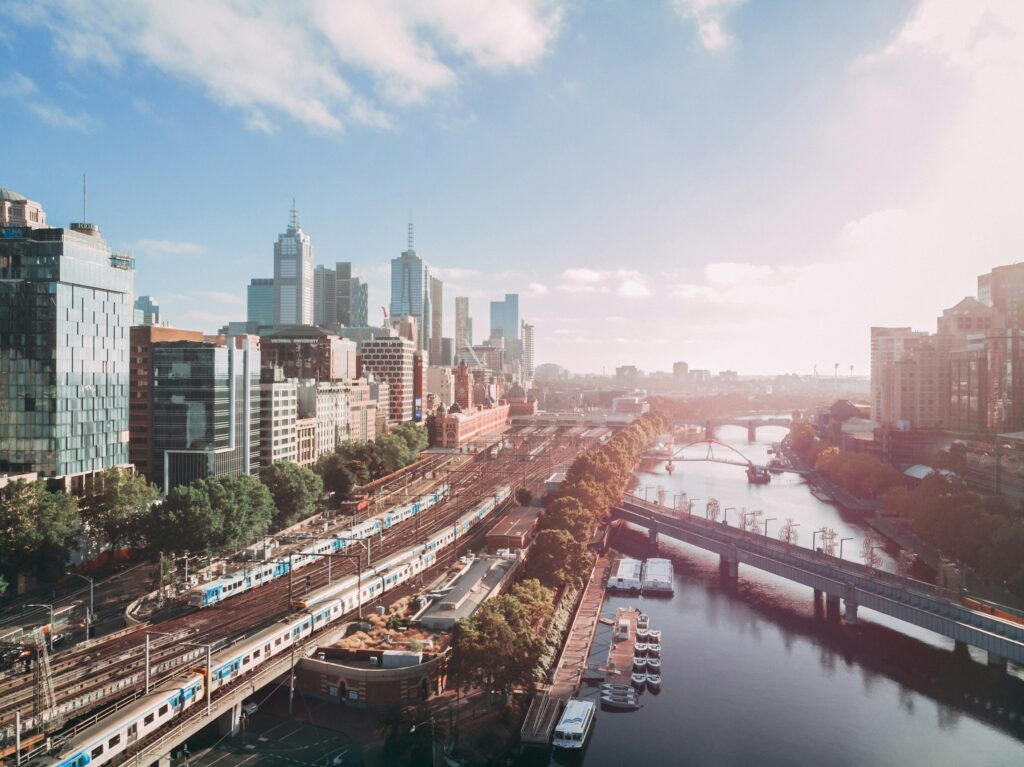
Are Expats in Melbourne Satisfied with Working Life?
Melbourne is known as Australia’s cultural capital, known to be a hub for arts and all things trendy, as well as a melting pot of diverse people. Expats from all around the globe are attracted to the city, seeking a better quality of life and career opportunities.
But amidst the allure of Melbourne’s cosmopolitan charm, a question remains: Are expats really satisfied with their working lives here? In this blog, we explore the realities behind working life in the city, to see how happy expats are and if it’s worth moving to Melbourne for work.
Breakdown of expats’ satisfaction working in Melbourne
In the 2022 Expat Insider Report, the latest report to show figures for Melbourne, ranked the Australian city as the 8th best city for expats overall, and the fourth best for working abroad.
Below, we can see how satisfied expats in Melbourne are with each area of working, compared to the global satisfaction rate.
| Area of working life | Melbourne expats satisfaction rate | Global expats satisfaction rate |
| Overall job satisfaction | 77% | 64% |
| Satisfied with working hours | 73% | 63% |
| Satisfied with work-life balance | 72% | 62% |
| Satisfied with salary | 70% | 62% |
| Satisfied with career opportunities | 68% | 58% |
| Satisfied with the job market | 61% | 47% |
We can see that expats in Melbourne are generally happier in all areas of their working life than the global average. This is a testament to the working conditions in Australia and demonstrates why the country and Melbourne specifically is a popular location for expats to emigrate to for work.
Typical working culture in Melbourne
In the Expat Insider Report’s Working Abroad index, Melbourne ranked 4th for the Work and Leisure category and 6th for Work Culture and Satisfaction category. This suggests that the working culture in Melbourne is generally favourable, offering a healthy work-life balance and acceptable working hours.
The standard working day in Australia is similar to that in the UK, with people working 9-5, Monday to Friday, with a break for lunch. Obviously, certain roles won’t fit into this schedule, as there will be different shift patterns, but there will generally be a 38-40 hour work week for full time workers. All full-time employees in Australia are entitled to 20 days of paid leave per year, and there are also a number of public holidays annually.
The working culture in Melbourne mirrors the Australian lifestyle – it leans towards a more informal, laidback approach. Good workers in Australia are praised for their positive attitude and energy, factors that are usually valued higher than just having the right qualifications. Whilst there will still be a business hierarchy, Australians tend to avoid standing on ceremony and emphasise equality, making for a more relaxed environment.
Average salary in Melbourne
In the Expat Insider Report, Melbourne ranked 19th for Salary and Job Security and also ranked 27th out of 50 in the Personal Finance Index, suggesting that salary and finance might be an area where Melbourne is lacking.
Salary Expert puts the average salary in Melbourne at $88,110 AUD per year, which works out to around £45,840 annually. Numbeo put the average monthly net salary in Melbourne at $6,103 AUD (£3,175) which is just 0.8% lower than the average monthly salary in London. With consumer prices being 14.3% higher in London than in Melbourne and rent being 71.2% higher in London, expats could find that their money goes further in Melbourne.
Job market and economy in Melbourne
Melbourne ranked 7th for career prospects in the Expat Insider Report’s Working Abroad Index. In general, in Australia, the services industry offers the most opportunity, followed by agriculture. In Melbourne, the local economy is highly diversified, with a particular focus on finance, manufacturing, research, IT, education, and tourism. This means there is ample opportunity to find a role in the city.
Many of Australia’s largest corporations have headquarters in Melbourne, including ANZ, BHP, and the National Australia Bank. It’s an important finance hub, ranking as the 32nd most competitive financial centre in the world in the 2022 Global Financial Centres Index. Melbourne is home to the second-busiest seaport in the country and the second-busiest airport, supporting the logistics and transportation sectors.
The wider state of Victoria has long been an important part of Australia’s economy. It has seen great recovery since the pandemic, with economic activity and full-time employment now above pre-2020 levels. It saw one of the fastest rates of growth in Australia in 2021-2022 and currently the economic growth rate is 14.1% higher than its decade average.
In March 2023, Vicotria had the highest increase in construction work completed out of all the Australian states, the second-strongest growth of retail spending, and the third-highest rate of population growth. All of this has contributed to a strong economy and ample career prospects for locals and expats alike.
Moving to Melbourne for work?
If you’re planning to move to Melbourne for work, to experience the job satisfaction that other expats have, make sure you’re covered with international medical insurance. Expatriate Group is an expert in international healthcare, with a range of insurance policies designed to protect expats living and working abroad. We also offer specific insurance for working overseas, providing comprehensive medical insurance for professionals abroad. Contact us for more information or get a quote online.

